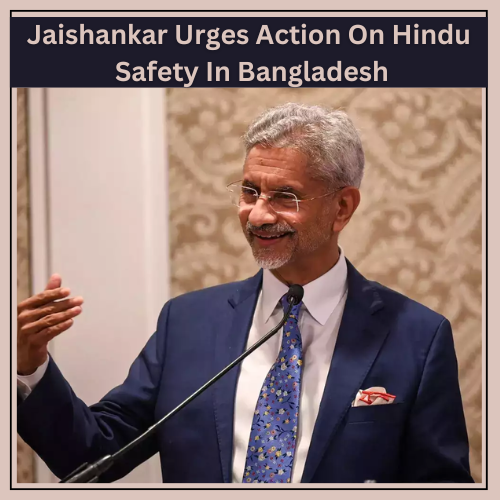Introduction
When it comes to fostering harmony and safeguarding communities, words and actions must align. Recently, Indian External Affairs Minister Dr. S. Jaishankar raised a crucial concern about the safety of Hindus in Bangladesh following incidents of violence targeting the minority community. His statement emphasized the responsibility of the Bangladeshi government to ensure the protection of all its citizens, regardless of their faith.
This isn’t just a diplomatic message; it’s a reminder of the shared cultural ties and regional values that bind India and Bangladesh. Protecting minority communities is not just about security—it’s about fostering trust and upholding the principles of equality and inclusion.

What Did Jaishankar Say?
In a clear and firm tone, Jaishankar highlighted Bangladesh’s obligation to safeguard its Hindu minority. He pointed out that ensuring the safety of all communities is a hallmark of a strong and harmonious society. His message wasn’t accusatory but served as a wake-up call for the need to act swiftly and decisively.
This statement came at a time when the world is paying closer attention to how nations treat their vulnerable populations. Jaishankar’s emphasis wasn’t just about protecting Hindus; it was a broader appeal for promoting unity, ensuring justice, and fostering goodwill in the region.
Why This Issue Matters
The Hindu community has a long-standing presence in Bangladesh, contributing richly to its culture and society. Despite this, they’ve often faced challenges, including sporadic instances of violence and discrimination. Each such incident serves as a grim reminder of the importance of vigilance and proactive measures to ensure minority rights.
Protection isn’t just about providing safety after an attack—it’s about creating an environment where everyone, irrespective of their religion, feels secure and valued. This issue isn’t isolated; it’s part of the broader dialogue about how societies can protect diversity and promote mutual respect.
India-Bangladesh Relations: A Strong Bond
India and Bangladesh share more than just a border. They share deep historical ties, cultural connections, and a legacy of mutual support. However, incidents like these can create ripples of tension, potentially affecting diplomatic relations. That’s why Jaishankar’s words were carefully crafted—not to create conflict but to strengthen accountability.
Both nations have a vested interest in maintaining harmony, not just within their own borders but also regionally. By addressing these concerns, India signals its commitment to supporting Bangladesh in its journey toward inclusivity and stability. This cooperation is essential for maintaining the peace and prosperity that both countries value.
Accountability: The Need of the Hour
Accountability isn’t just a word—it’s a commitment to fairness and action. In this case, ensuring the safety of Hindus in Bangladesh means not only condemning acts of violence but also actively preventing them through robust measures. This could include stronger law enforcement, community engagement, and promoting tolerance through education.
Bangladesh has taken steps in the past to address communal issues, but challenges remain. With the world watching, it’s an opportunity for the country to set an example by protecting its minorities and showing that its commitment to inclusivity is unwavering.
The Bigger Picture
What happens in one corner of the world often echoes globally. When minorities face attacks, it tarnishes the image of the society as a whole. For Bangladesh, these incidents could harm its reputation as a nation striving for peace and equality. Addressing these issues isn’t just about immediate safety—it’s about long-term communal harmony and national pride.
On the flip side, a proactive approach to protecting minorities can enhance Bangladesh’s standing on the international stage. It shows the world that the nation values every citizen and is committed to building a society where diversity is celebrated, not threatened.
A Call for Collective Action
Jaishankar’s words remind us that protecting communities isn’t the responsibility of one nation alone—it’s a shared effort. Governments, local authorities, and even individuals have a role to play in ensuring safety, fostering understanding, and promoting peace.
For travelers, activists, and global citizens, this is a moment to reflect on how we can support initiatives that uphold human rights. Let’s take inspiration from this call for action and work towards a world where every person, no matter where they live, feels secure and valued.
Conclusion: Moving Forward Together
Jaishankar’s statement is more than a diplomatic comment—it’s a heartfelt reminder of the need for compassion, justice, and unity. Protecting Hindus in Bangladesh isn’t just about resolving an isolated issue—it’s a step toward creating a region where harmony thrives and diversity is celebrated.
As we look ahead, this moment serves as a call to action for all of us. It’s a chance for Bangladesh to reaffirm its commitment to inclusion and for all of us to champion the values that bring us together. Together, we can make sure that no one is left vulnerable, no matter where they call home.
